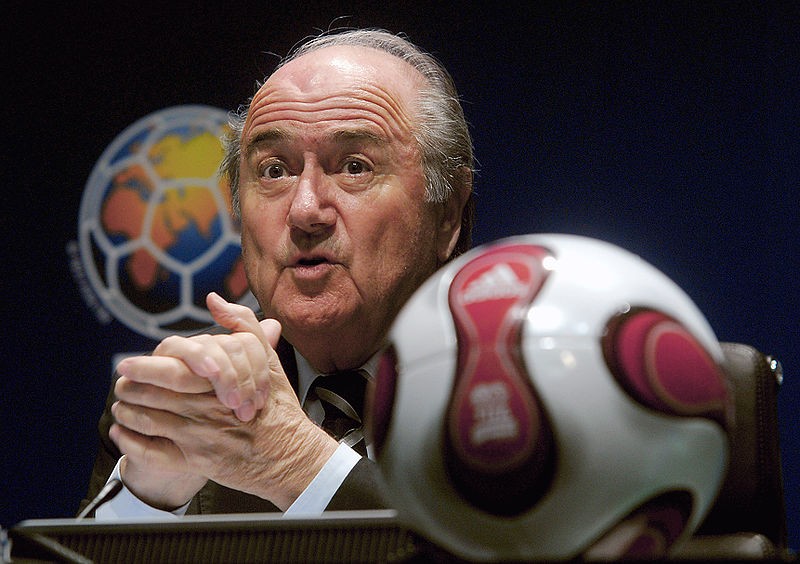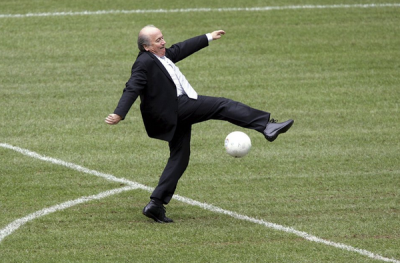
Joseph Blatter speaking about the 2014 World Cup. Image: Agencia Brasil. Creative Commons Attribution 3.0 Brazil License
On May 29, Joseph Blatter celebrated being re-elected for his fifth term as FIFA’s president. Two days earlier, 14 FIFA officials had been arrested in Zurich, Switzerland, for money laundering, bribery and tax evasion in a US-led operation, but he was “the man who wouldn’t give up”, as pointed by The Economist.
After defeating his opponent, Jordan’s Prince Ali bin al-Hussein with 133 votes to 73, Blatter proclaimed himself as “the president of everybody” and declared in an interview he wouldn’t be stepping down because “that would mean I recognize that I did wrong.”
Four days later on June 2, he decided to leave his seat.
The announcement took the world of sports by surprise. The Swiss football administrator held the president’s title for 17 years. In his speech, Blatter himself claimed the motivation of his decision was his “deep care for FIFA and its interests, which I hold very dear”.
While, some newspapers named this “a great day for football”, former footballers such as Portugal’s Luis Figo (who may have a chance on taking Blatter’s seat) and England’s Gary Lineker went to Twitter to express their thoughts:
Blatter has resigned. Can't quite believe it. FIFA always appeared to be such a fine upstanding organisation.
— Gary Lineker (@GaryLineker) junio 2, 2015
Change is finally coming. Let’s find a solution to start a new era of transparency and democracy in FIFA. http://t.co/XXYt1NfooH
— Luís Figo (@LuisFigo) junio 2, 2015
In Brazil, 1994 world champion and current congressman Romário Faria credited Blatter’s announcement as “the best news in a very long time” and the dawn of a “new era to football worldwide”. The player, who launched an investigation into the Brazilian Football Confederation following last week’s arrests, wrote in his Facebook page:
A saída de Battler abre uma enorme lacuna, é hora de darmos as mãos. Agora sim, podemos dizer que abrimos caminho para uma mudança efetiva no futebol mundial. Nas últimas décadas, a FIFA se transformou apenas em uma máquina de ganhar dinheiro. Interesse que ficou acima da missão do futebol de unir os povos, derrubar barreiras sociais, despertar paixões. É hora de retomarmos essa missão social.
Blatter’s exit opens a huge breach, it is time for us to hold hands. Now, we can say that we paved the way to an effective change in football worldwide. In the last decades, FIFA transformed itself in only a money-making machine. Greed prevailed over football’s mission of uniting people, taking down social barriers, waking passions. It is time for us to retake this social mission.
The ball with Blatter
Just the night before of the announcement, British comedian John Oliver held a segment on his US TV show “Last Week Tonight” about the FIFA arrests. After calling out on the entity’s official sponsors to take down Joseph Blatter, he stated:
The problem is all the arrests in the world will change nothing as long as Blatter is still there, because to truly kill a snake you must cut off its head.
As published by The Guardian, when Blatter joined FIFA in 1975, the institution:
[…] had just 12 employees, he created the model of kickbacks, patronage and pork barrel politics over a period in which Fifa’s revenues have soared – and turned a blind eye to the staggering greed among those afforded a piece of it.
After being elected president for the first time in 1998, coupled with the 23-year experience working within the federation, Blatter came to expand FIFA’s activities including million dollar championships for Futsal and Beach Soccer in his “portfolio”. Amidst storms, he reigned supreme and steadily established a ‘Blatter’s way of rule’ till this latest scandal. Andrew Jennings, an investigative reporter who authored three books breaking FIFA’s secrets and delivered documents that helped the FBI investigation, defined the system run by Blatter as “an organized crime family”. So, resigning the presidency doesn’t mean Blatter’s will cut ties with FIFA. Actually, in his resignation speech — after explaining he was leaving because he did not “have a mandate from the entire world of football — the fans, the players, the clubs, the people who live, breathe and love football” — he seemed to be launching a crusade to clean his beloved entity's soul:
Since I shall not be a candidate, and am therefore now free from the constraints that elections inevitably impose, I shall be able to focus on driving far-reaching, fundamental reforms that transcend our previous efforts. For years, we have worked hard to put in place administrative reforms, but it is plain to me that while these must continue, they are not enough.
Something he allegedly was “blocked” from doing so in the past decades.

Image: Rashid Ali Garcia/Twitter
What will come next
In his announcement, Blatter also stated he would be asking for an extraordinary executive committee meeting to vote for his successor, since the next ordinary congress is set to happen only in May 2016. A new election is likely to take place between December and March. Till then, Blatter continues on the throne. The bets for who will be replacing Blatter favor French former footballer Michel Platini, currently president of UEFA, followed by Prince Ali bin Al-Hussein — the candidate defeated by Blatter last week — and Luis Figo (who stepped down a few weeks before last week's FIFA Congress).
UEFA President Michel Platini has the best odds to become next FIFA President. pic.twitter.com/YkR7bupaMy
— SportsCenter (@SportsCenter) junio 2, 2015
But there may be a few surprises along the way. On Tuesday night, former Brazilian footballer Zico (who also coached national teams of Japan and Iraq) also announced he would be interested in running. According to FIFA rules, anyone who works with football for at least five years and has the support from five of the 209 national federations can present his or her candidacy.
Many questions will need to be addressed in the next months. As progressive US news website Think Progress points:
The most pertinent question might be what happens in Qatar. Last week, Burrow called for an “immediate re-run of the votes” for the 2022 World Cup in the wake of the corruption allegations. The Qatari bid has long been the subject of criticism amid corruption allegations and major human rights concerns, from the country’s treatment of LGBT people to working conditions that could claim the lives of an estimated 4,000 workers before the World Cup there even kicks off.
The main question however is if Blatter’s exit will be enough to change the rotten system supporting FIFA’s wrongdoings. Open Data Institute suggests that transparency is the only way to go:
It could show a detailed breakdown of outgoings, which totalled around $5.4bn between 2011 – 2014. These could include the operational costs associated with the World Cup and other tournaments, the payments it makes to member associations and confederations, and the costs of maintaining committees and congress. Access to this type of open data would enable citizens throughout the 209 nations Fifa represents to understand the financial decisions it makes and hold its leaders to account.






